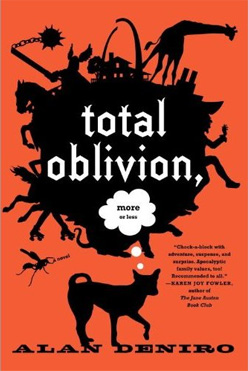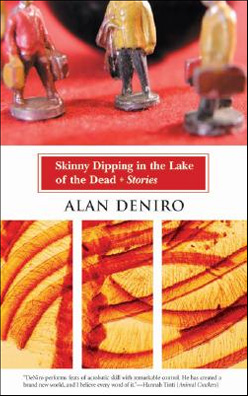Half-Centaur, Half-Chimera: Humanism and Science Fiction
Charlie Jane Anders has a very thoughtful essay at io9 entitled “Is ‘Science Fiction Humanism’ A Contradiction In Terms?”:
But is science fiction really humanist? Much of science fiction turns out to be about exploring our vast cosmos, and expanding our being. From this quest, one of two outcomes often arises: 1) We meet something greater than ourselves. 2) We become something greater than our current selves. It’s rare, and becoming rarer, to find science fiction that rejects both mysticism and posthumanism. You could even argue that if the journey doesn’t change us somehow, then what’s the point?
And if the journey does change us radically, are we still the mere humans that humanism purports to celebrate?
This might be the central question of 21st century sf, and why it’s still so essential (I talk about this in my Rain Taxi review of The New Space Opera, which Charlie cites.) I also think that this is the key point of intertwining between science fiction and fantasy, and why they are, genre-wise, in the same boat (even with fantasy currently ascendant): that search for transcendental content.
Zizek is consistently a writer I find maddening and fascinating in equal portions. But he had a passage in First as Tragedy, Then as Farce that I thought was highly relevant to this discussion, in which he talks about the threat of privatization (by capitalism) of three different “commons”: the commons of culture, the commons of external nature (i.e., the precipitation of ecological disaster) and most relevant for our discussion here, the commons of internal nature, which he defines as “the biogenetic inheritance of humanity”:
with new biogenetic technology, the creation of a New Man in the literal sense of changing human nature becomes a realistic prospect…
in other words, “the self-annihilation of humanity itself” as a definitive last act of “capitalist logic.”
He goes onto say:
we are in danger of losing everything: the threat is that we will be reduced to abstract subjects devoid of all substantial content, dispossessed of our symbolic substance, our genetic base heavily manipulated, vegetating in an unlivable environment.
What’s interesting in the field of science fiction is how many writers still fail to recognize the potential moral precipice society is on (and how we have indeed been pushed there by capitalism), much less tackle it through the art forms at our disposal, despite the rich heritage of such moral questioning in the genre. (As well as the obsession about “getting paid,” in awards and $$$ through the embrace of mediocrity, for its own sake. But that’s another post.) We are also in an age where, in fantasy, the geneticism of Monsters has been normalized. Nothing is more popular than heros and heroines as vampires, heros and heroines as werewolves, etc. We have grown more comfortable with the bioengineering science has provided us, even if they are packaged in mythopoetics. Many stories are about the recombinance of “bloodlines”-he’s a half vampire, half human, she is a were-leopard, etc. etc. (Just throwing out examples here.) These fictions are anticipatory, prophetic texts for the parahumans we might find in our global culture.
And yet, so much of our science fiction, rather than processing this march toward the inhuman, “the reduction of humans to manipulable machines” (Zizek again), is cheerleading the emulsification. A world of all objects and no subjects would be the final triumph of capitalism. Many sf writers write “against” the destruction of the first two commons (the first discussed-destruction of a common culture-having a great deal to do with intellectual property rights…and we need to say little to remind ourselves which writers have loaded for bear in this regard). No one wants ecological apocalypse. Yet many-not all, but many-would hail the totalizing vision of the anti-human, total nihilism masked inside a Singularity.
Purity is sexy, you know?
But this transcendence is, as always, a myth. Thinking realistically, how this transformation would not be under the purview of large biogenetics corporations is something I fail to grasp. The fact that this is a zone of contention within fiction proves that it is indeed a “hot spot”, in flux, and worthy of writing fiercely about.
Which many are.
But not nearly enough.





(As well as the obsession about “getting paid,” in awards and $$$ through the embrace of mediocrity, for its own sake. But that’s another post.)
I’d like to read that other post. This isn’t the first gesture toward it you’ve made lately, and it’s got me starting to wonder who you’re really angry with. Because it reads somewhere between a high modernist gentleman amateur’s contempt for professionalism and a 20th century white bourgeois dilettante’s disdain for the sellout — either way naively unproblematized and badly in need of deconstruction. I’d like to think you’re too postmodern and too hiphop to fall into those traps.
(Once we’ve got that cleared up, I’ll be happy to talk about chimeras and big pharma and the continued salience of Sterling’s “Cyberpunk in the Nineties” and Zizek’s charmingly quaint construction of “human nature” till the cows come home.)
I hope I am David, at least. Those 2 poles are things I’d like to avoid at all costs. “Spot the sellout” became old in 1999 or so I think. I wish my new site redesign had a search bar (need to fix that) but I’ve written a lot of posts throughout the years on “ambition” and my views really haven’t changed from those posts.
Also, I know I might be coming across as cryptically strident, or stridently cryptic, but I hope I’m working toward something re: humanism without the mind-body dichotomy.